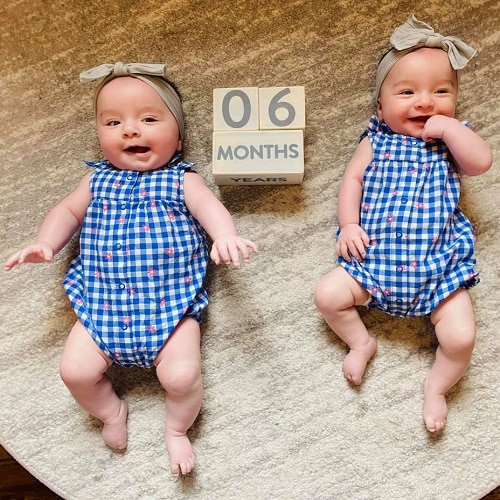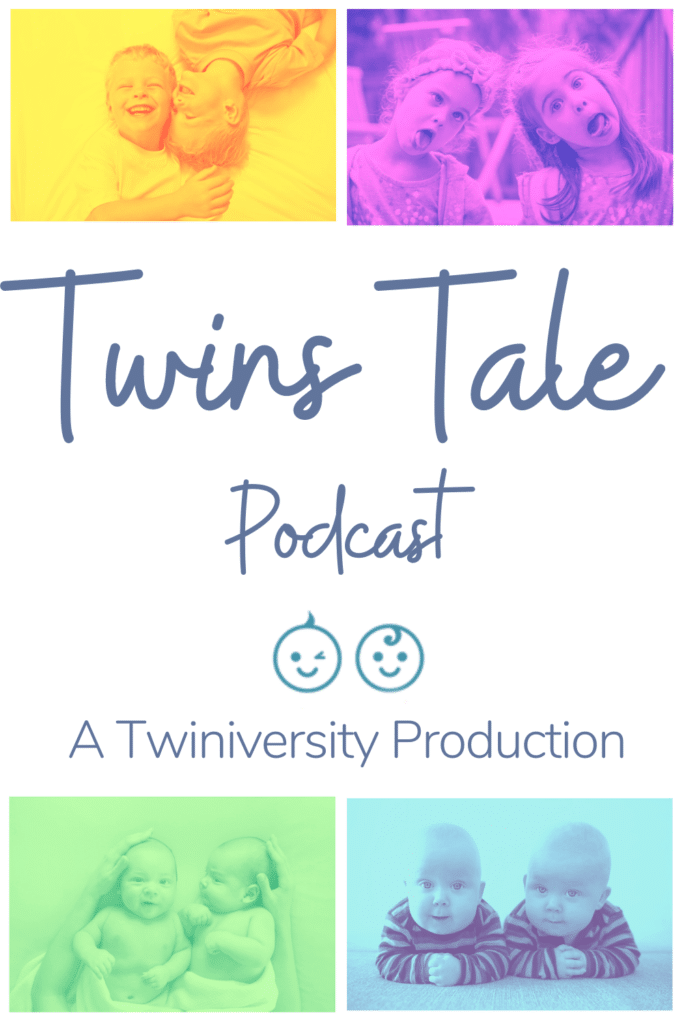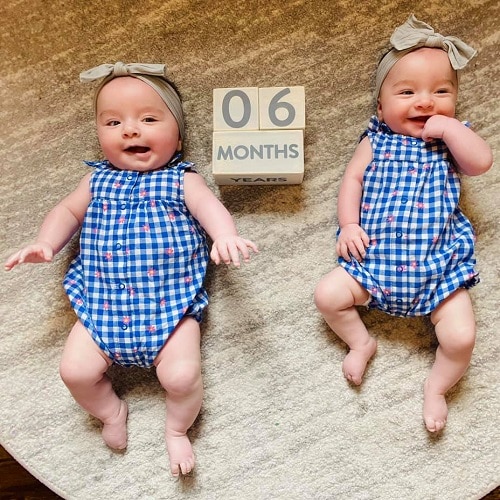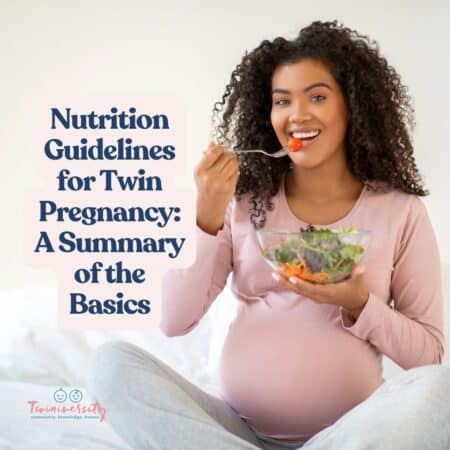Last updated on May 20th, 2024 at 02:13 pm
Learn what to expect with your infant twins week 26, including tips, tricks, and advice from real twin parents who have been there.
All content on this website, including medical opinion and any other health-related information, is for informational purposes only and should not be considered to be a specific diagnosis or treatment plan for any individual situation. Use of this site and the information contained herein does not create a doctor-patient relationship. Always seek the direct advice of your own doctor in connection with any questions or issues you may have regarding your own health or the health of others.
Your Twins Week 26
Welcome back returning twin parents! Hello and welcome to the new twin parents who are just finding us today!
You made it through your first five months as a twin parent and you’re now heading into your sixth month of twin parenthood. What a huge accomplishment! Little known secret: we knew you could do it!
Now what? Well, this is a good place to start. We have plenty of information and resources to help you navigate twin parenting with your twins week 26.
Our twin parenting tips come from our very own experienced twin parents from around the world! These parents have all been there, done that, and are ready to share their tips and tricks with you.
These first months are full of excitement, questions, and even some anxiety. Not to worry, we’ve got your back. We’ve laid out all our best tips, tricks, and advice for twins week 26.
Got preemies? Make sure to consider your premature twins’ corrected age when reviewing whether or not they are meeting their milestones at appropriate times. In the vast majority of cases, preemies catch up by school-age and go on to succeed at the same level as their peers. Learn more about twin milestones here

What to Expect with Twins Week 26
- 6 months is a huge milestone! You’re halfway to their first birthday! This is the month where a lot of things happen. You can start introducing solid foods and a sippy cup, they’ll start sitting up on their own any day now, and there’s a good chance they’ll be able to sleep 12 hours through the night soon, if they aren’t already.
- Your twins may love to bounce when held upright, which strengthens their leg muscles in preparation for crawling and walking.
- You’re probably doing 5 to 6 feedings of breastmilk or formula a day (every 4 – 5 hours). Make sure you’re feeding your babies at the same time and putting them down to sleep at the same time to keep them together on a schedule. Learn more about bottle-feeding here
- Babies may be taking up to 8 ounces every 4 to 5 hours at each feed for twins 6 months old, but if your babies are preemies they may be eating less. Ask your pediatrician what is the appropriate amount for your babies based on their weights.
- When your twins start moving around in their crib you know it’s time to move the crib mattress to the bottom position.
- Now is a good time to start introducing solid foods. Aim for once a day to start and eventually you’ll get to 2-3 times a day in the next few months. The majority of their nutrition will still come from breastmilk or formula. Make sure to introduce one food at a time and wait 3-4 days before introducing the next food so you’ll know immediately if there’s a food allergy. Parents typically choose between two approaches: purees or baby led weaning. Talk to your doctor about this at their 6 month checkup.
- But what foods should you avoid for your babies? According to the Mayo Clinic:
- Postponing the introduction of highly allergenic foods, such as peanuts, eggs and fish, hasn’t been shown to prevent eczema, asthma, allergic rhinitis and food allergy. In fact, early introduction of certain foods, such as peanuts and eggs, might decrease the risk of allergy to that food. Still, especially if any close relatives have a food allergy, give your child his or her first taste of a highly allergenic food at home — rather than at a restaurant — with an oral antihistamine available. If there’s no reaction, the food can be introduced in gradually increasing amounts.”
- Don’t offer cow’s milk or honey before age 1. Cow’s milk doesn’t meet an infant’s nutritional needs — it isn’t a good source of iron — and can increase the risk of iron deficiency. Honey might contain spores that can cause a serious illness known as infant botulism.
- Don’t offer foods that can cause your baby to choke. As your baby progresses in eating solid foods, don’t offer hot dogs, chunks of meat or cheese, grapes, raw vegetables, or fruit chunks, unless they’re cut up into small pieces. Also, don’t offer hard foods, such as seeds, nuts, popcorn and hard candy that can’t be changed to make them safe options. Other high-risk foods include peanut butter and marshmallows. To introduce nuts and prevent choking, spread peanut butter in a thin layer or puree peanut butter or peanuts with fruits or vegetables.
- If your family has a history of food allergies you may want to look into a daily supplement that gently introduces your babies to peanut, egg, and milk, the three most common childhood food allergens. Ask your doctor for details.
- Expect to go through 70-100 diapers per week for twins through 30 weeks old (roughly 7 months). Here’s where you can stock up: buy on Amazon. If your diapers are leaking on a regular basis, that’s the sign that you need to move up a size.
- If you haven’t already, look into joining a local moms of multiples club (aka twin club). Read about local twin clubs here

Want to be the first to know about giveaways, deals, and more just for twin parents? Sign up for the Twiniversity email list! Subscribe today to get emails about giveaways, events, weekly article roundups, and more! Pregnant with twins? We’ll be sending you a weekly twin pregnancy email to keep you on track with your pregnancy to-do list! Click here to learn more… and while you’re at it, check out our Complete Baby Safety Course and Twin Parent Memberships.
Common Concerns From the Moms Who Have Been There With Twins Week 26
- How do we deal with daycare germs and keep our twins from getting sick?
- How do I know if my twins are ready to sleep train?
- Where do we start with solids?
- What can I do to split my time more fairly between my twins?
- What can we do to cut our budget to afford our twins?

The Twins Tale Podcast by Twiniversity is an intimate look into the lives of twin parents and their twins at all ages and stages, from birth through college. We interview twin parents in the trenches and ask all the burning questions you want to know about raising twins: schedules that work, feeding your twins, getting out of the house, finding sanity, and so much more. Subscribe for FREE today!
Milestones & Developmental Leaps Parents Have Noticed With Twins Week 26
What’s going on with development in twins week 26?
- Your twins might be sitting up with just a little help from you now.
- One or both of your twins may be showing signs of getting their first tooth. They may be fussy, drooling, and irritable as they begin teething. Check out some of our best teething tips here.
- You might see your twins reaching for one another intentionally as their interactions increase.
- Once that first tooth breaks through it’s time to start brushing. Start slow with a child-sized toothbrush (buy on Amazon). You may opt to use a smear of fluoride-free toothpaste (buy on Amazon) about the size of a grain of rice.
- What if your baby rolls on to her stomach in her sleep? Should you turn her back over? If she can roll back over by herself then there’s no need, but if she can’t then you should turn her on to her back. Learn more about safer sleep
- Most doctors now advise starting solids at 6 months old to ensure your baby’s gut is ready to process solid foods. Some babies don’t yet have the oral motor skills to swallow solids and it may take them a while to get the hang of it. Once your twins are ready, this will open up a whole new world for your daily routine. But remember — the main source of food should still be breastmilk or formula until their first birthday. Read more about starting solids
- Your twins may finally be sleeping for longer stretches. Now may be the time to start looking into sleep training or sleep coaching if you haven’t already. Learn more about sleep training here
- Your babies may begin to hold their own bottles at this time. Encourage them to try holding their own bottles when they are interested.
Inform your doctor if your child:
- Shows no affection for caregivers
- Doesn’t try to get things that are in reach
- Doesn’t respond to sounds around him
- Has difficulty getting things to his mouth
- Doesn’t make vowel sounds (“ah”, “eh”, “oh”)
- Doesn’t roll over in either direction
- Doesn’t laugh or make squealing sound
- Seems very stiff, with tight muscles
- Seems very floppy, like a ragdoll
While most babies begin teething around six months, that first tooth can appear anytime between three and 14 months. Teething babies often want to chomp on things, so the pressure of an emerging tooth beneath the gums can be relieved by counter pressure. When the tooth moves through the bone and gum, it tends to come in stages, with more activity at night than during the day, so a baby may be more irritable in the evening. Chilled teething rings and a clean finger rubbed gently along the gums can provide some soothing relief.
Parents can find relief for their little one’s painful gums and irritability with a plant-based homeopathic medicine like Colic plus Soothing Drops. This teething medicine made by Culturelle also helps with minor digestive upsets sometimes associated with teething.* Colic plus Soothing Drops does not contain benzocaine, and it will not numb your baby’s gag reflex or interfere with nursing. The pre-measured liquid dose is simply squeezed into the baby’s mouth so there is no need to rub on gums.
*Claims based on traditional homeopathic practice, not accepted medical evidence. Not FDA evaluated.
Challenges You Might Experience With Twins Week 26
There are some challenges to look out for with twins week 26
- You might find your babies have a hard time starting solids. Learn how to transition to solids with your twins here and learn more about baby led weaning here
- Sleep regressions are common. Learn more about sleep regressions Learn more about sleep regressions here
- Many parents report trouble getting their twins to nap around this time. Read how some twin parents get their twins to nap here
- Creating a good night time routine with your twins. Read more about creating a sleep routine here
- You might be craving some adult interaction around this time as you are falling into a bit of a routine. This is a great time to connect with local moms, especially other twin moms for your own sanity. Read more about joining a twin mom club here
- You may start to notice a change in your friendships, especially with those who don’t have kids and/or twins. Read about changing friendships here and how to make new friends here
- Did you know that many of the symptoms of teething are the same as a cold? Teething can bring on a low-grade fever, coughing, ear pain, diarrhea, irritability and more. Learn the symptoms of teething here.

Tips from Parents of Twins Week 26
Take some tips from experienced twin parents!
- Put wet a washcloth in the freezer for teething relief.
- Babyproof before you need to.
- Get your twins on a nap schedule.
- The more tummy time, the better.
- Be flexible but consistent with your schedule.
- Get outside with your twins when you can.
Personal Advice from Parents of Twins Week 26
“Stick to a routine at nighttime. My kids have been going to bed by 7:30 since we brought them home at 2 weeks old from the NICU. They don’t cry before bedtime. That’s a huge win! Increase in food (we feed formula and increased from 5 to 6 ounces) during the day so you can start weaning the feedings at night. My twins are just starting to interact with each other so I’m trying to keep them together as often as I can. (Tummy time, activity centers, reading, etc. ) Establish a routine for yourself and your significant other. Twins consume your entire day unless you block time for yourself (even a bath) or to go on a walk together.”
Olya V.
“Remember that your babies are individuals and will hit milestones at different times. On that note… don’t get too hung up on the milestones. Especially if you have preemies. They will get there in their own time. Always think 2-3 hours ahead when planning activities. Getting out of the house with infant twins IS possible. Just over-prepare. Don’t forget to think outside of the box. What works for one family does not always work for another.”
Abby G.
“Babies like to be held very close when rocking to sleep. A Boppy pillow can be used to assist with learning to sit up. Including babies in the bottle making process calms them down while they’re waiting. Put a scarf on a ceiling fan over your bed and babies will be entertained for hours. Babies love to have dance parties”
Ana S.

Got twins? Us too! The Twiniversity Podcast with Natalie Diaz was created BY parents of twins FOR parents of twins, from your pregnancy days through your twin’s teenage years, this podcast covers it all. It’s all about parenting twins, offering plenty of strategies for making life better, parenting hacks, and, of course, humor. We are laughing WITH you every step of the way.
Questions You Might Have for Your Pediatrician About Your Twins Week 26
The American Academy of Pediatrics (AAP) recommends babies get doctor checkups at birth, 3 to 5 days after birth and then at 1, 2, 4, 6, 9, 12, 15, 18 and 24 months. Reminder that twins = two co-pays for each doctor’s visit.
Printable List of Doctor Questions for Twins 6 Months Old
- Are my twins old enough for a flu shot?
- Is it best to make our own baby food?
- What is the best way to sleep train twins?
- When can we give water to our twins?
- When should we start practicing with a Sippy cup?
- Can we cut out the night feed yet?
You Might Want These Items for Your Twins Week 26
- Expandable Play Yard (buy on Amazon)
- Bath kneeler and elbow rest (buy on Amazon)
- Baby bath seat (buy on Amazon)
- Bath toy storage (buy on Amazon)
- Bath toys (buy on Amazon)
- Baby hair rinsing pitcher (buy on Amazon)
- Bath spout cover (buy on Amazon)
- Toy keys (buy on Amazon)
- Toy cell phone (buy on Amazon)
- Baby musical toys (buy on Amazon)
- Mesh chewers for soft fruits and veggies (buy on Amazon)
- Baby bowls, spoons, and plates (buy on Amazon)
- Dr. Brown’s Cheers 360 Trainer Cup (buy on Amazon)
- MAM Learn to Brush Set (get two — buy on Amazon)
- Tom’s of Maine Fluoride-Free Strawberry Toothpaste (buy on Amazon)
- Fisher-Price Jumperoo (buy on Amazon)
- Summer Infant Pop N’ Jump portable activity center (buy on Amazon)
- Evenflo Exersaucer 3-in-1 (buy on Amazon)
- Evenflo Doorway Jumper (buy on Amazon)
- Fisher-Price Kick and Play Piano Gym (buy on Amazon)
- Munchkin Mozart Music Cube (buy on Amazon)
- Soft sensory books (buy on Amazon)
- Double stroller (check out our double stroller guide here)
- Structured baby carrier (buy on Amazon)
- Teethers (buy on Amazon)
- White noise machine (buy on Amazon)
- High chairs (buy on Amazon)
- Romp & Roost LUXE Playard (learn more)
- Love to Dream Transition Bag for when they start to roll (buy on Amazon)
- NoseFrida the “Snotsucker” (buy on Amazon)
- Baby toys like the Whoozit (buy on Amazon), the Winkle (buy on Amazon), Take Along Tunes (buy on Amazon), and a floor mirror (buy on Amazon)
- For more recommended baby products, click here
You Might Want These Items for Yourself
- Twins monthly milestone baby blanket (buy on Amazon)
- Milestone baby photo cards (buy on Amazon)
- Self-care items such as makeup, hair products, new clothes, or anything to make you feel human again
Feeding and Nap Schedule for Twins Week 26
A schedule with twins in week 26 is key! Now that your twins are becoming more demanding of your time and attention, scheduling and organization is more important than ever!
Here is a suggested feeding and nap schedule for twins 6 months old. You can see that adding tummy time and playtime before each nap is a good way to ensure they are getting enough of it throughout the day.
- 7 am feed
- 8 am tummy time and play
- 9 am nap
- 10 am wake and play
- 11 pm feed
- 12 pm tummy time and play
- 12:30 pm solids
- 1 pm nap
- 2 pm wake and play
- 3 pm feed
- 4 pm tummy time and play
- 4:30 pm solids
- 5 pm nap
- 6 pm wake, bath, and book
- 7 pm feed and down for the night
- 11 pm feed and back to bed
- 3 am feed and back to bed
- When your doc gives you the OK to stop waking them up at night, feed both babies when the first baby wakes and cries to eat and get them back to sleep ASAP.
Do the best you can every day to keep them on the same feeding and sleeping schedule. If you get off track try again for the next feeding or nap.
Do everything in your power to feed your twins together to make sure you get breaks. If they are on opposite feeding schedules, you will never get a break — and you deserve one!
Sleep Advice From the Sleep Lady
If you’re beginning to feel like your twins 6 months old may never get the hang of consistently sleeping through the night and napping reliably, you aren’t alone. You may feel like they will ALWAYS need you to be within arms reach in order to fall asleep and stay asleep. We can assure you that eventually things really DO get better in the sleep department. Even with twins!
The Sleep Lady, Kim West, LCSW-C says: “In order to make sure that your child is getting the most out of their daytime sleep, you need to understand your child’s minimum nap requirements. For the first six months, it’s important to just follow your baby’s sleep cues and help them get as much sleep as they need. Beyond six months, you can begin to follow a flexible schedule for their meals and naps, which can be accomplished with gentle nap training.”
See more of what The Sleep Lady Recommends about your newborn twins’ sleep here.
When to Call the Doctor
It’s better to overreact 100% of the time than to underreact once.
Natalie Diaz, Twiniversity Founder and Mom of Twins
All content on this website, including medical opinion and any other health-related information, is for informational purposes only and should not be considered to be a specific diagnosis or treatment plan for any individual situation. Use of this site and the information contained herein does not create a doctor-patient relationship. Always seek the direct advice of your own doctor in connection with any questions or issues you may have regarding your own health or the health of others.
When it comes to calling your doctor or seeking medical advice, you have to learn to trust yourself. No one knows your babies like you do. If you feel something isn’t right, it probably isn’t when it comes to your twins 6 months old. When in doubt, call. That’s why the offices have an answering service and have staff on call at night or on the weekends.
That being said, there are a few guidelines to follow. There are a few circumstances under which you should call your doctor and get medical advice, or even call 911. When you call you should have a pen and paper handy and be prepared to give the following information over the phone:
- Immunization records
- Any medications, dosages, and times last taken (even over the counter drugs)
- Medical history
- Your baby’s temperature
- Mention that the baby is a twin, in case of a contagious illness
Any time you see the following symptoms with your twins you should contact your pediatrician immediately.
- Blood in vomit
- Blood in stool
- Seizure
- Suspected poisoning
- Bleeding you cannot stop
- Unable to move
- Limpness
- A rectal temperature of 100.4 or above
- Sleeps more than usual or will not wake up
- Yellow skin or eyes
Call your doctor as soon as possible if one or both of your twins experiences any of the following.
- Refusal to eat for multiple feedings in a row
- Diarrhea or vomiting
- A cold that will not resolve itself or gets worse
- Unexplained rash
- Signs of dehydration (no tears, no wet diapers, sunken eyes, sunken soft spot)
- Ear drainage
- Will not stop crying
When to Call 911
Please note that when you call 911, you and your baby will be taken to the nearest emergency room. This may or may not be located at your preferred hospital.
- Your baby is turning blue or taking more than 60 breaths per minute
- Your baby has a seizure which lasts more than 3 minutes or you cannot reach their doctor by phone immediately
- Suffers from convulsions, unconsciousness, or irregular breathing following a fall or from bleeding
- You think your baby may have a skull, neck, back, or pelvic fracture (DON’T move your baby)
- Your baby suffers from a compound fracture where bone is sticking out from the skin (cover it with a clean cloth and do not touch it)
- Your baby has bleeding you cannot stop after applying pressure for 10 minutes
Again, learn to trust your gut. When in doubt, call and see what your doctor thinks. Believe it or not, they’re happy to help.
What You Should Read for Twins Week 26
3 Things You Can Do Today to Help Your Marriage
Gentle Reminder: You’re Not Relaxing, You’re Recovering
What’s The Biggest Challenge About Having Twins?

Need some twin parent friends? Get the support you need with a Twiniversity Membership. Benefits include a monthly twin parent club meeting on Zoom, access to a private Facebook group just for twin parents, and a video library of twin parenting lessons. Visit Twiniversity.com/membership to join today!
Don’t Forget to Do These Things With Twins Week 26
You probably feel like you’re starting to fall into a bit of a routine with your twins 6 months old. At the very least, you’re probably beginning to settle into chaos as your normal. The good news is that it will continue to get better as time goes on! We have put together a few things to remember that will surely help you out in the coming weeks.
- Keep a master list. This is a great way to track schedules, important numbers and dates. It can be used as a guide for baby sitters, as well as for you when your having a “mom-brain” moment.
- Time goes faster than you think! Before you know it, your little babies will be off to kindergarten. Hold onto that thought as they are crying in the middle of the night. Try to soak up the fact that they just want to be with you,even though you just want some peace.
- Snap a video or photo of your twins trying foods. Make sure you have a camera or your smartphone handy when you give your twinnies their first taste of solids. Their faces will be priceless and you will get a kick out of seeing them for years to come!
- Don’t forget your marriage. The past 6 months have likely been a blur. This is a great time to reconnect with your partner. Get a sitter, get dressed up, and go out for the night. Even just an hour for a quiet coffee break will do wonders for your marriage right now!
- Celebrate your twins half-birthday! This celebration is as much for you as your babies. And who is turning down an excuse for cake?!
An excerpt from Twiniversity founder Natalie Diaz’s book, “What To Do When You’re Having Two“
Write it Down
Whether or not you two got along before you had twins, lists are now going to be your best friend. Make a list of everything that you need to do – for the children, yourself, and for your spouse. At the end of the day, review what you’re done. This is a great way to stay organized and to feel like you actually accomplished something. If you’re having trouble remembering where your list is, buy a magnetic pad and put it on the refrigerator and you won’t waste any time searching or compiling multiple lists!
Do It Now
Remember that saying, “Don’t put off for tomorrow what you can do today”? Well, let’s take it one step further and say, “Don’t put off for tomorrow morning what you can do tonight.” After the twins are in bed is a great time to pack your diaper bag, wash bottles, and prepare new ones for the next day. Get as much of tomorrow’s work done today as possible.
Photos of Twins Week 26




Return to the First Year with Twins Home
Sources
- Dr. Ilona Bendefy, Baby: Day by Day
- Dr. Frans X. Plooij and Dr. Hetty van de Rijt, The Wonder Weeks
- Marple, Kate, and Dawn Rosenberg. “When to Call 911: How to Tell If Your Baby Needs Emergency Care.” BabyCenter
- “Newborn Baby: When to Call the Doctor.” Cleveland Clinic
- “How Often and How Much Should Your Baby Eat?” HealthyChildren.org
- “How Much and How Often to Feed Infant Formula?” CDC.org
- “Physical Appearance and Growth: 4 to 7 Months.” HealthyChildren.org
- “6-Month-Old-Babys-Development” Whattoexpect.com








